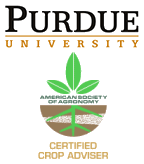
Proceedings 2007
Indiana Certified Crop Adviser Conference
Closing the Corn Yield Gap: Management Practices that Improve Soil Quality and Net Productivity but Reduce Global Warming Potential
Meeting the projected global demand for food and fuel from corn while conserving natural resources and improving environmental quality can only be achieved by the intensification of existing corn systems. Yield analysis of the central U.S corn-belt indicates that there is a large exploitable yield gap for corn. Since 1999 we have been experimenting with optimizing corn management systems to exploit corn yield potential.
To date, our experience has shown that considerable yield increases are realized by choosing the right combination of adopted varieties, planting date and plant populations to maximize crop productivity. In addition, more intensive N management strategies that cater not only to improving crop N use efficiency but also residue carbon management aid in reducing nitrogen input over the long-term. Significant increases in soil organic matter and N storage have resulted from intensification of crop management practices. In addition, intensification has not caused a significant increase in the global warming potential of these cropping systems.
Daniel WaltersProfessor of Soil Science
University of Nebraska
dwalters@unlnotes.unl.edu
Daniel Walters is professor of soil science in the Department of Agronomy and Horticulture, University of Nebraska. He teaches courses in soil management, soil fertility, plant nutrition and root/soil interface modeling. He is a native of Illinois and obtained his BS and MS degrees from the University of Illinois - Urbana/Champaign and PhD from the University of Minnesota in St. Paul. Dr. Walters’ research emphasis is the study of nitrogen and carbon cycling in intensively managed agricultural ecosystems especially as these systems affect soil quality, climate change and food production. He has traveled extensively throughout Latin America, Europe, and Africa studying soil ecosystems.